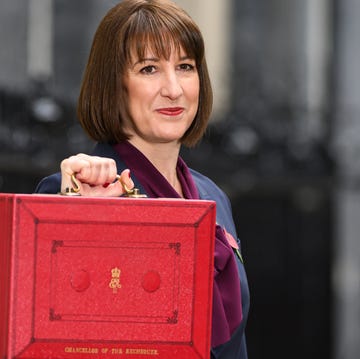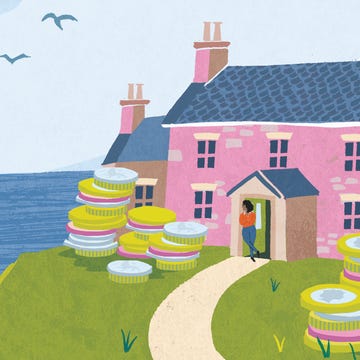The arrival of October used to be all about autumn colours, preparing for Halloween and spending cosy evenings indoors, but in the past five years, it has also become about bracing for a hike in energy prices — and usually just in time for switching the heating on!
From 1 October 2024, typical gas and electricity prices are rising by around 10%, adding an extra £12 a month to the average bill for a household that uses gas and electricity on a standard variable-rate energy tariff and pays by direct debit. For these customers, the increase in the energy price cap means that their annual energy bill is likely to go up from £1,568 to £1,717, on average.
For any households that have been feeling the pinch and struggling with bills since the start of the cost-of-living squeeze, it may be cold comfort to know that energy prices are still lower than last winter. In October 2023, the average annual bill was £1,834.
What is the energy price cap?
The energy price cap sets the maximum amount that energy suppliers can charge for each unit of energy and for the standing charge. The calculation is based on typical energy use for households using gas and electricity so if you use more than the typical household your bill will be higher, and if you use less, it will be lower. The amount you pay can also vary depending on where you live, the type of meter you have and your payment method.
Energy price capping was brought in by the government in 2019 and prices are adjusted quarterly, so you're probably already wondering what will happen come January. Energy analysts at Cornwall Insight are currently predicting a slight decrease (1%) to the average annual bill of a typical dual fuel consumer (to £1,697) and a further slight decline through summer 2025.
That said, bills remain hundreds of pounds above historic averages and Ofgem is currently undertaking a review of the cap as part of its assessment of general consumer protection measures.
We are still feeling the effects of the increase in global fuel prices that began in summer 2021 when economies started opening up after the pandemic against a backdrop of reduced supply of fuels from some producers and increased tensions between Russia and Ukraine. Prices increased further in late 2021/early 2022 and spiked after Russia launched its invasion of Ukraine. The first major impact on UK households was a 54% increase in the price cap in April 2022. Prices have still not returned to their earlier levels.
What does the energy price cap mean for my energy bills?
The impact that the increase in the energy price cap will have on your energy bills depends on what type of energy deal you're currently on.
On a standard variable-rate tariff?
The price cap affects the 85% of households that are on a standard variable-rate tariff (also called a default tariff). So if you pay for your electricity and gas by either standard credit (you make payment when you get your electricity and gas bill), direct debit, a prepayment meter or Economy 7 (E7) meter, you will be affected — along with around 27 million other households in England, Wales and Scotland.
The average bill will be around £1,717 per year but the actual amount you pay will depend on how much energy your household uses, where you live and the type of meter you have.
As a guide to how much you can expect your household to pay under the new cap use the MoneySavingExpert Energy Price Cap calculator too (works for England, Scotland and Wales).
On a fixed-rate tariff?
If you took advantage of a fixed-rate tariff last year, you may be temporarily immune from any price rises now. Around 5 million households are currently on a fixed-rate tariff — where the unit price for gas and electricity doesn't change for the duration of the plan. These households won't be affected immediately by the 10% price increase.
Energy price cap per unit and standing charge 1 October to 31 December 2024, Ofgem
Electricity: 24.50p per kWh, 60.99p daily standing charge
Gas: 6.24p per kWh, 31.66p daily standing charge
What can I do to beat the energy price cap rise?
While we may be powerless to do anything to change the actual energy price cap, there are things you may be able to do to help soften the blow to your bills slightly.
Take a meter reading
If you have a functioning smart meter, you don’t need to do anything. If not, provide a meter reading to your supplier as soon as possible to make sure that you are charged at the right rates for the energy you use before and after 1 October. This will stop your supplier from using an estimated reading that could be higher than your actual usage. Take a photo of your meters when you take your readings.
Look into a fixed-rate tariff
If you can switch to a fixed-rate energy tariff that would work out cheaper for you than staying on a standard variable-rate tariff, switch!
Check out comparison sites, such as uSwitch and MoneySuperMarket or sign up to MSE’s Cheap Energy Club and it will automatically compare energy prices, providers and tariffs for you.
Currently, there are a number of reasonably priced one-year fixed-rate tariffs (dual fuel) worth considering, according to analysis by Money Saving Expert:
*Outfox the Market's Outfox the Price Cap (Oct 24) Fix'd Dual v2 works out at 9.4% cheaper than the new price cap, saving roughly £120 per year for typical households. There is a cancellation fee of £50 per fuel.
*British Gas's Fixed Tariff v8 comes in at 8.9% less than the cap (£100 dual fuel exit fee).
*Octopus Energy has various fixed tariffs but all are cheaper per unit than the Price Cap. It's 15 month fixed deal October 24 v1 is 8.8% cheaper than the cap. There's no exit fee.
*E.On's Next Fixed 12m v28/Next Gust 12m v12 works out 8.8% less (£100 dual fuel exit fee)
Check whether you're eligible for help with energy bills
The increase to the energy price cap comes hot on the heels of news of planned changes to the Winter Fuel Payment that will see financial support withdrawn from many previously-eligible households. The Winter Fuel Payment is now only available to pensioners in receipt of other means-tested benefits, such as Pension Credit.
"The planned abolition of the Winter Fuel Payment (WFP) is expected to impact around 10 million pensioners in England and Wales, significantly reducing the number of recipients from approximately 11.4 million to just 1.5 million," says consumer and money expert Helen Dewdney. "Those still able to still access the allowance are those over state pension age who claim certain benefits, including Pension Credit. It is estimated that around 880,000 low-income pensioner households are entitled to claim Pension Credit but are not currently doing so."
Use the Pension Credit calculator on the Gov.uk website to see if you're eligible.
Jonathan Brearley, CEO of Ofgem, says: “We know that this rise in the price cap is going to be extremely difficult for many households. Anyone who is struggling to pay their bill should make sure they have access to all the benefits they are entitled to, particularly pension credit, and contact their energy company for further help and support.”
Save energy wherever you can
There are plenty of practical steps you can take in the home to keep warm and save money on your heating bill. Check out our practical guide for the full rundown:
As a starting point, do the following to help save energy at home and reduce your energy bills:
- Check that your boiler is in good condition. Most people have had the heating switched off for six months or so. Check it's working before you really need it. Consider getting it serviced if you haven’t had one in the last 12 months. If you have an older boiler, you may want to consider boiler cover.
- Change your thermostat and boiler settings. The World Health Organisation suggests most healthy people should heat their homes to 18°C. Energy Saving Trust claims that you can reduce your energy bill by 10% by reducing your thermostat by one degree if your heating is set above 18°C.
- Review the times your heating is set to come on and go off to ensure you are not wasting heat while you are not home. For example, you could have your heating come on before you get up in the morning, and just before you come home from work in the evenings. There are also plenty of new apps that help you monitor energy consumption and suggest changes. Check out theivie app, the Hugo app and Utrack.
- Change your radiator settings. Bleeding your radiators will prevent cold spots, and you may want to consider turning radiator valves down – or off – in the rooms you use less often so you are not heating rooms unnecessarily. Keep your radiators free from obstructions, like furniture, for maximum heat.
If you are struggling to pay your energy bill...
*Contact your supplier to arrange a payment plan.
Gas and electricity bills are considered to be priority bills which means your supplier could cut you off if you do not pay. Citizens Advice says your supplier is obliged to help you find a way to pay. Call Citizens Advice consumer service English helpline: 0808 223 1133 and Welsh helpline: 0808 223 1144 for tailored advice.
*Check out other Government help
There are several government schemes to help with the rising cost of bills, though some of the rules have changed. These include:
- Warm Home Discount Scheme - a one-off £150 discount off your electricity bill. If you’re eligible, your supplier will apply the discount directly to your bill.
- Cold Weather Payment - you may get this if you’re getting certain benefits or Support for Mortgage Interest.
- Winter Heating Payment – a single payment during the winter for some in Scotland.
- Boiler Upgrade Scheme (BUS) - a grant to cover part of the cost of replacing fossil fuel heating systems with a heat pump or biomass boiler.
- The Household Support Fund – this has just been extended for another six months and is to helps poorer households pay for basics like food and energy bills.
If you are worried about spiralling debt, you can talk to a trained advisor at Stepchange via its debt helpline for free on 0800 138 1111.















